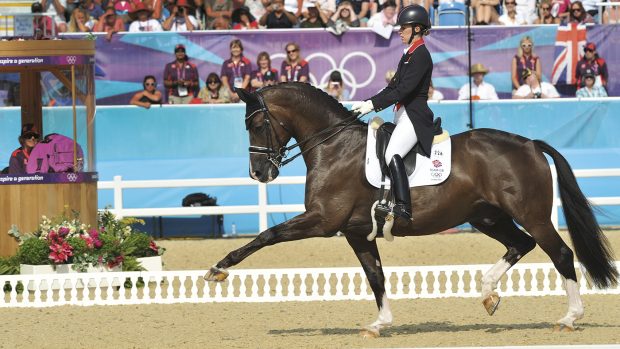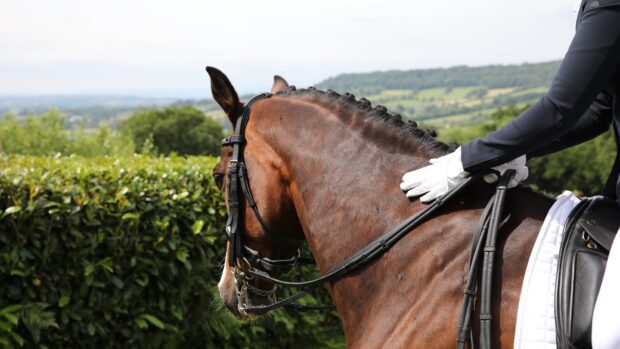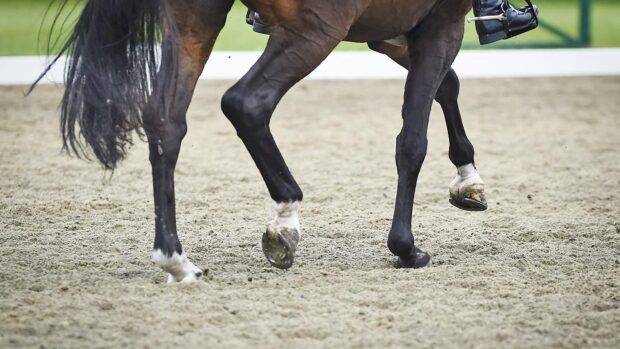Are you thinking about stepping up to affiliated dressage competitions this season? If so, this guide will take you through everything you need to know about competing under British Dressage (BD) rules – including costs, levels, and what to expect at your first show.
Do I need a flashy warmblood to take part?
Absolutely not! Dressage is a test of training, accuracy, and harmony between horse and rider – not just flashy movement. Horses and ponies of all types and breeds successfully compete in affiliated dressage, from native ponies to ex-racehorses and everything in between.
BD also runs dedicated championships for specific breeds and horse types, giving riders a chance to compete against others on similar horses. At the Cavago Associated Championships held in October there are sections for:
- Arab Horse
- British Native Pony
- Draught Horse
- GB PRE (Purebred Spanish Horses)
- Lusitano
- TGCA (Traditional Gypsy Cobs)
- CHAPS (Coloured Horses and Ponies)
- Retraining of Racehorses (ROR) and Thoroughbred Championships
- Veteran Horse and Rider Championships
So, whether you’re riding a thoroughbred straight off the track or a sturdy native pony, there’s a place for you in affiliated dressage!
How much does it cost to join British Dressage?
The cost of competing in BD events depends on your membership level. Here are the key prices:
- Full (Competing) membership – £9.25 per month / £102 annual payment
You’re eligible to compete in any BD event, at any level, with access to a variety of championship pathways. Just remember – a full horse registration is also required!
BD also offers discounted full membership options for riders who compete seasonally or are new to affiliated dressage.
Winter membership is ideal for eventers or those who only compete during the colder months. It provides full rider and horse registration from October to March for £60 each.
Trial membership gives new members a three-month taster of full membership, including access to competitions and member benefits, at a reduced rate of £36 for riders and £16 for horse registration. This option is only available to those who have never been a BD member before.
- Full horse registration – £7.50 per month / £85 annual payment
For all new horse registrations, a copy of the horse’s passport must be sent with the application form so the BD office can verify that the horse’s name matches the details on their passport.
- Club membership (for grassroots-level competitions) – £60 annual payment
Club membership is the ideal starting point for those new to affiliated dressage, allowing riders to compete in prelim bronze qualifier classes, as well as My Quest and Team Quest events, combined training, and music championship qualifiers.
Club membership costs £40 per year, and there is an additional £20 annual fee for club horse registration. Riders who qualify for higher-level championships, such as the Petplan Area Festivals Championships or the Associated Championships, must upgrade to full membership to compete.
For all memberships, in addition to membership fees, you’ll also need to pay entry fees for each class you enter.
Can I try affiliated dressage without paying for a membership?
Yes! If you want to test the waters before committing, you can compete using class tickets.
- Class Tickets cost £10 each
- One ticket allows you to enter one affiliated class
- Standard entry fees still apply
- You and your horse must register as BD community members (free) to use class tickets
With a class ticket, you can win rosettes, prize money, and BD points. You can also use results gained on a ticket towards qualification for the Associated and Combined Training Championships but nothing else.
Why compete in affiliated dressage?
Affiliated competitions offer a higher standard of judging and consistency, ensuring fairness at all levels.
“Our judges go through an accredited training system, so you can be sure of a consistent level of judging,” says a BD spokesperson.
BD also provides clear pathways for riders to progress, from grassroots to top-level dressage. To ensure fair competition, each level is divided into bronze, silver and gold sections, based on the points a horse and rider accumulate at that level.
- Bronze: for those new to a level, competing against others of similar experience.
- Silver: for more experienced combinations ready to step up.
- Gold: for skilled riders or those producing younger horses. Gold riders can stay at each level as long as they choose, allowing flexibility in progression.
So, while you might find yourself warming up next to an Olympian, rest assured – you’ll still be competing on a level playing field with plenty of chances to take home titles and rosettes!
How do the points work?
In affiliated dressage, points are awarded when you compete at prelim level and above and achieve a minimum score of 60%. These points track your progress and determine your eligibility for future competitions. The higher your score, the more points you earn – for example, a score in the low 60s earns fewer points than a score in the 70s or 80s, with a maximum of 11 points awarded for scores of 80% and above.
Points are not awarded in intro classes, music classes, young horse classes, or Team Quest competitions. There is also a separate points system for CDI-level competitors.
Guide to affiliated dressage levels
BD competitions range from intro to grand prix, providing a structured progression for riders and horses.
- Intro – Walk and trot only
- Prelim – Introduces canter
- Novice – Adds lengthened strides in trot and canter
- Elementary – Introduces lateral work, counter-canter, and medium trot
- Medium – Features extended paces, half-pass, and simple changes
- Advanced medium – Introduces flying changes
- Prix st georges (PSG) & inter I (“Small Tour”) – A stepping stone to elite competition
- Inter II & grand prix – The highest levels, featuring piaffe, passage, and one-time changes
BD offers national tests up to advanced, while PSG and above follow FEI international standards.
Starting out? Try BD Quest!
If you’re new to affiliated dressage, BD Quest is a fun, low-pressure introduction to affiliated dressage.
Competitions are available at intro, prelim, and novice levels and are split into two formats:
- My Quest – Individual rider competitions
- Team Quest – Team events for groups of three to four riders
To take part, both horse and rider need a BD Club membership. With a focus on progression, team spirit, and enjoyment, BD Quest provides an accessible and supportive entry into affiliated dressage – a fantastic way to develop your skills while making new friends along the way.
Other championship opportunities
Both winter and summer BD seasons conclude with championship events, with qualification opportunities available at all levels.
If you’re progressing from BD Quest, the next step is Area Festivals – a series of championship-style competitions open to riders with:
- A minimum of 63% in three prelim to advanced medium tests
- A minimum of 60% in two PSG and inter I tests
A top-two finish at an Area Festival (with a qualifying score) moves you on to the Area Festival Championships
These events provide a clear pathway for grassroots riders to progress up the levels while competing in prestigious settings.
Can I still compete in unaffiliated dressage?
Yes! There are no rules preventing you from competing in unaffiliated dressage while holding a BD membership.
Most unaffiliated competitions follow BD rules, though they may not always use official BD-accredited judges, meaning scoring may not be as consistent as in affiliated competitions.
Do I have to plait for affiliated dressage?
No, plaiting is not compulsory!
However, most riders choose to plait for BD events unless their horse is of a breed where a loose mane is traditional. Plaiting can enhance your horse’s appearance, making their topline look more defined – so it’s worth considering.
You might also be interested in:

Fancy giving British Dressage Quest a go? Here’s what you need to know

7 things you wanted to know about affiliated dressage but were too embarrassed to ask

Struggling to learn and remember your dressage test? Here’s the secret to success…

Dress for success with Horse & Hound’s what to wear guide for dressage competitions

Subscribe to Horse & Hound magazine today – and enjoy unlimited website access all year round
Horse & Hound magazine, out every Thursday, is packed with all the latest news and reports, as well as interviews, specials, nostalgia, vet and training advice. Find how you can enjoy the magazine delivered to your door every week, plus options to upgrade your subscription to access our online service that brings you breaking news and reports as well as other benefits.






